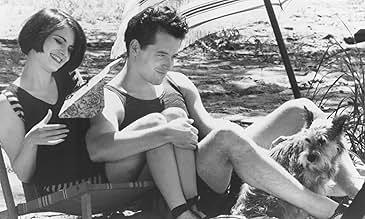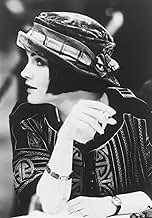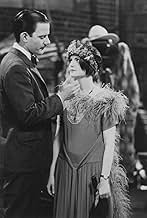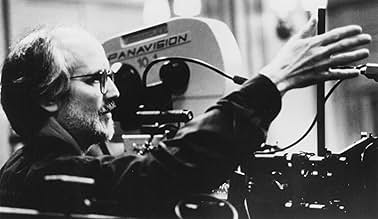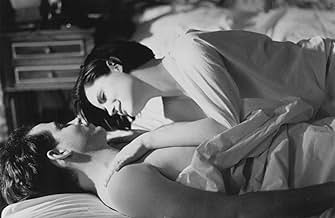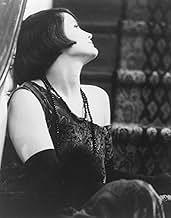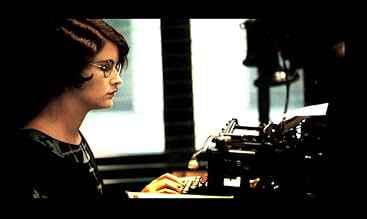Agrega una trama en tu idiomaDorothy Parker remembers the heyday of the Algonquin Round Table, a circle of friends whose barbed wit, like hers, was fueled by alcohol and flirted with despair.Dorothy Parker remembers the heyday of the Algonquin Round Table, a circle of friends whose barbed wit, like hers, was fueled by alcohol and flirted with despair.Dorothy Parker remembers the heyday of the Algonquin Round Table, a circle of friends whose barbed wit, like hers, was fueled by alcohol and flirted with despair.
- Dirección
- Guionistas
- Elenco
- Premios
- 2 premios ganados y 8 nominaciones en total
James Le Gros
- Deems Taylor
- (as James LeGros)
- Dirección
- Guionistas
- Todo el elenco y el equipo
- Producción, taquilla y más en IMDbPro
Opiniones destacadas
I am a fan of many of the writers who flit in and out of this movie, but I confess I don't know much about their personal lives and habits (except perhaps for Benchley, and Thurber who is only barely mentioned in this film). This film gives the viewer a good sense of what it must have been like to be part of the wildly creative crew that surrounded the legendary Algonquin Round Table, but a very confused picture of Dorothy Parker's life. Only someone who already knows her story, and can keep her various husbands and lovers in order, can piece this mish-mash together. And none of the performers are strong enough to seem like anything more than walk-ons dressed as famous people. (The "gang" scenes work because of the fast pacing; the movie drags when we spend time with the individuals.) According to comments recorded here, Miss Leigh is doing a good vocal impression of Dorothy Parker. Maybe so (I've never heard Parker), but Leigh's delivery is so totally annoying that it's enough to drive the AUDIENCE to suicide. Is she trying to do Hepburn on downers? Sometimes her mannered accent veers toward Transylvanian.
Throughout the movie, Parker herself denigrates her little "doodad" poems, but that's all the film offers us of her creative output. We never really find out about the contents of her books and plays, and how she ended up in Hollywood (and what she wrote there). After a few of her doggerel verses, they become trite. I began to wonder if people think these poems are funny because they know they're SUPPOSED to be funny.
I'm sure there's probably a good movie in Mrs. Parker's life, but I don't think this is it.
Throughout the movie, Parker herself denigrates her little "doodad" poems, but that's all the film offers us of her creative output. We never really find out about the contents of her books and plays, and how she ended up in Hollywood (and what she wrote there). After a few of her doggerel verses, they become trite. I began to wonder if people think these poems are funny because they know they're SUPPOSED to be funny.
I'm sure there's probably a good movie in Mrs. Parker's life, but I don't think this is it.
The movie is episodic and depends too much on the viewer's having prior knowledge of the life of Dorothy Parker and her literary friends. Its saving grace is Jennifer Jason Leigh as Mrs. Parker. Her only flaw is that, in trying to look and sound like Parker, her dialog is often hard to understand. Still, one of the greatest and most under-rated performances by an actress in an American film in the 1990s.
While watching this film last night on IFC, I found myself appreciating the social, historical and artistic subject matter. Despite Mrs. Parker's obvious and overwhelming psychological dysfunctions, I felt this was a genuine "true to life" expression of one participant's subjective experiences. This was a unique, if not quite legendary, circle of literary talent -- certainly deserving of serious cinematic treatment such as this.
BUT....
There was another side to the story -- a healthier, less appalling, less depressing side. To discover "the rest of the story", I highly recommend Harpo Marx' autobiography "Harpo Speaks". Although Harpo also recalls the scathing insults and practical jokes that were a central part of the story of this Round Table group, his book relates a number of hugely funny and sometimes heart-warming scenes that indicate that at least some of these people truly cared for each other and expressed strong positive feelings in many different settings. In short, Harpo's stories (e.g. several "croquet fanatic" episodes) offer a telling comedic counterpoint to Mrs. Parker's almost continually cynical and self-pitying pathos. Read Harpo's book to balance out the negative. You'll be glad you did.
BUT....
There was another side to the story -- a healthier, less appalling, less depressing side. To discover "the rest of the story", I highly recommend Harpo Marx' autobiography "Harpo Speaks". Although Harpo also recalls the scathing insults and practical jokes that were a central part of the story of this Round Table group, his book relates a number of hugely funny and sometimes heart-warming scenes that indicate that at least some of these people truly cared for each other and expressed strong positive feelings in many different settings. In short, Harpo's stories (e.g. several "croquet fanatic" episodes) offer a telling comedic counterpoint to Mrs. Parker's almost continually cynical and self-pitying pathos. Read Harpo's book to balance out the negative. You'll be glad you did.
Jennifer Jason Leigh is Dorothy Parker in "Mrs. Parker and the Vicious Circle," a 1994 film also starring Campbell Scott, Peter Gallagher, Stanley Tucci, Matthew Broderick, Gwenyth Paltrow, Jennifer Beals, Lili Taylor, Martha Plimpton, Wallace Shawn - a large, excellent cast which would be needed to tell the story of the glittering literary geniuses who were part of the Algonquin Roundtable. Oh, to have been an adult in those days ('20s-'40s) when wit and education and intelligence were so prized! Parker, a unique talent who could write with pathos and humor, was surrounded by the likes of Robert Benchley, Edna Ferber, Charles Macarthur, Alexander Woolcott, Deems Taylor and Robert Sherwood. The sad thing is that if you're a young person and you happen to catch this film on the IFC channel, you won't have heard of any of these people. Nor will you be interested enough to look them up. People don't seem to have the intellectual curiosity they once did. I realize these are generalizations - just how general remains to be seen.
The atmosphere is set wonderfully in this film, which tells something of Dorothy Parker's sad life as she finds and loses love. Unfortunately, with possibly the exception of Campbell Scott as Benchley and at times Ms. Leigh, everyone is PLAYING Woolcott, MacArthur, etc. It's all a kind of let's pretend instead us showing us real people -- as famous as they all were, they were human beings. The script is uneven; the crazy, frenzied scenes at the Algonquin are the best ones, but we don't know these people well enough to be interested in smaller scenes.
I had the great pleasure of seeing Jason Leigh on Broadway in "Proof" and she was excellent - she is a very fine actress with a broad range. But in her attempt to successfully have all of Dorothy Parker's externals, she's tripped herself up. I unfortunately only understood maybe 40% of what she was saying. Not only do I doubt that was true of the real Dorothy, I also doubt going that far with the voice was necessary - very, very few people who would see this film ever heard Dorothy Parker speak. It's a little like doing Eliza Doolittle - if you actually spoke pure Cockney, the audience wouldn't understand a word. Parker's droll tones channeled through Leigh's mouth don't work. She does, however, create a very real and very sad person who lived in an interesting time, wrote about it and who loved and drank her way through it.
The atmosphere is set wonderfully in this film, which tells something of Dorothy Parker's sad life as she finds and loses love. Unfortunately, with possibly the exception of Campbell Scott as Benchley and at times Ms. Leigh, everyone is PLAYING Woolcott, MacArthur, etc. It's all a kind of let's pretend instead us showing us real people -- as famous as they all were, they were human beings. The script is uneven; the crazy, frenzied scenes at the Algonquin are the best ones, but we don't know these people well enough to be interested in smaller scenes.
I had the great pleasure of seeing Jason Leigh on Broadway in "Proof" and she was excellent - she is a very fine actress with a broad range. But in her attempt to successfully have all of Dorothy Parker's externals, she's tripped herself up. I unfortunately only understood maybe 40% of what she was saying. Not only do I doubt that was true of the real Dorothy, I also doubt going that far with the voice was necessary - very, very few people who would see this film ever heard Dorothy Parker speak. It's a little like doing Eliza Doolittle - if you actually spoke pure Cockney, the audience wouldn't understand a word. Parker's droll tones channeled through Leigh's mouth don't work. She does, however, create a very real and very sad person who lived in an interesting time, wrote about it and who loved and drank her way through it.
I found this movie totally enjoyable from start to finish. Maybe because Jennifer Jason Leigh is one of the most superb actresses of our time (and of course ignored!!!). Or maybe because I love period pieces with lavish attention to detail in the costumes and production designing. Or maybe because I am always entertained by true stories of humanity. I think in this movie's case, it is all three. This is another portrait of the dark side of fame. Leigh did a wonderful job being Mrs. Dorothy Parker, a 1920s poet and magazine writer who drank (during prohibition New York) and caroused with a large, mouthy group of professionals in the writing and stage business. It's easy for anyone to relate to the lonliness Mrs. Parker feels in this boisterous "circle" of shallow, back-stabbing people. In spite of her gift for smooth, haunting, beautiful poetry (much of it recited in this movie), Mrs. Parker is not happy or fulfilled. Rather she is misunderstood, isolated and self-depreciating. She ends up losing a job over salary disputes, losing her husband to alcohol, and falling deeply and hopelessly in love with the married Charles McArthur (Matthew Broderick), who impregnates and betrays her. Mrs. Parker's only comfort in life is the friendship she has with Bob Benchley (an excellent Campbell Scott). Leigh, speaking with a facinating accent, brings sadness and cynicism to Mrs Parker with perfection.
¿Sabías que…?
- TriviaThe founding of the "New Yorker" magazine is a subplot in this movie; Wallace Shawn's father, William, was, for many years, editor-in-chief of "The New Yorker".
- Citas
Dorothy Parker: Razors pain you, rivers are damp, acids stain you, drugs cause cramp. Guns aren't lawful, nooses give, gas smells awful; you might as well live.
- ConexionesFeatured in Would You Kindly Direct Me to Hell?: The Infamous Dorothy Parker (1994)
Selecciones populares
Inicia sesión para calificar y agrega a la lista de videos para obtener recomendaciones personalizadas
- How long is Mrs. Parker and the Vicious Circle?Con tecnología de Alexa
Detalles
- Fecha de lanzamiento
- Países de origen
- Idioma
- También se conoce como
- Mrs. Parker and Mr. Benchley
- Locaciones de filmación
- Productoras
- Ver más créditos de la compañía en IMDbPro
Taquilla
- Presupuesto
- USD 7,000,000 (estimado)
- Total en EE. UU. y Canadá
- USD 2,144,667
- Fin de semana de estreno en EE. UU. y Canadá
- USD 74,512
- 27 nov 1994
- Total a nivel mundial
- USD 2,144,667
- Tiempo de ejecución
- 2h 5min(125 min)
- Color
- Mezcla de sonido
- Relación de aspecto
- 2.39 : 1
Contribuir a esta página
Sugiere una edición o agrega el contenido que falta


